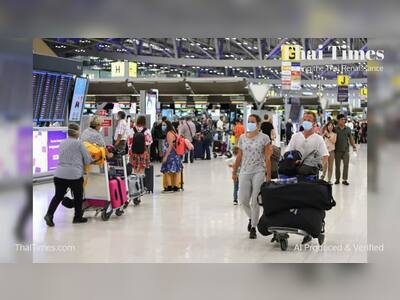Malaysia Enforces Border Laws With Arrests Amid Heightened Security
First arrests made as Malaysia tightens control over cross-border movement with Thailand, aiming to curb illegal crossings and smuggling.
In an assertive move to regulate cross-border activities, Malaysian authorities have detained four individuals attempting illegal entry between Malaysia's Kelantan state and Thailand's Narathiwat province.
This marks the first arrests since Malaysia's enforcement of strict border laws that commenced on December 1st.
Among the detained were two Malaysian and two Thai nationals, apprehended at separate locations in Rantau Panjang, a town directly across the Golok River from Sungai Kolok in Narathiwat.
The Malaysian police, led by Kelantan's Deputy Police Chief Ayob Khan Pitchay, announced these arrests, underscoring the nation's intensified efforts to combat cross-border smuggling and crime.
The names of the Thai individuals, aged 33 and 50 years, remain undisclosed, though they are under investigation for illegal entry.
The proximity of the towns on either side of the Golok River has historically facilitated cross-border movement, with several residents using informal means to visit family across the border.
However, these informal crossings have also been exploited for illicit activities, prompting Malaysia's stringent policy measures.
The enforcement of these laws is part of a broader Malaysian strategy to tighten border security.
Initially, plans aimed for a special police force deployment at these critical border points from December 1st, but this has been postponed to January 1st.
The Malaysian news agency Bernama reported this delay, attributing it to logistical considerations.
On the diplomatic front, the Thai consulate-general in Kota Bharu cautioned Thai nationals about the strict enforcement measures.
They urged travelers to use legal checkpoints, complete with passports or border passes, when entering Malaysia.
This advisory aligns with the mutual understanding that regulating legal pathways is essential for maintaining the safety and economic stability of both regions.
The enforcement of these laws highlights the collaborative challenges faced by neighboring countries managing porous and historically low-key borders.
As Malaysia moves forward with its border security plans, policy adherence will be critical in addressing the dual concerns of illegal migration and smuggling, while ensuring the safety of those residing in proximate border communities.
This marks the first arrests since Malaysia's enforcement of strict border laws that commenced on December 1st.
Among the detained were two Malaysian and two Thai nationals, apprehended at separate locations in Rantau Panjang, a town directly across the Golok River from Sungai Kolok in Narathiwat.
The Malaysian police, led by Kelantan's Deputy Police Chief Ayob Khan Pitchay, announced these arrests, underscoring the nation's intensified efforts to combat cross-border smuggling and crime.
The names of the Thai individuals, aged 33 and 50 years, remain undisclosed, though they are under investigation for illegal entry.
The proximity of the towns on either side of the Golok River has historically facilitated cross-border movement, with several residents using informal means to visit family across the border.
However, these informal crossings have also been exploited for illicit activities, prompting Malaysia's stringent policy measures.
The enforcement of these laws is part of a broader Malaysian strategy to tighten border security.
Initially, plans aimed for a special police force deployment at these critical border points from December 1st, but this has been postponed to January 1st.
The Malaysian news agency Bernama reported this delay, attributing it to logistical considerations.
On the diplomatic front, the Thai consulate-general in Kota Bharu cautioned Thai nationals about the strict enforcement measures.
They urged travelers to use legal checkpoints, complete with passports or border passes, when entering Malaysia.
This advisory aligns with the mutual understanding that regulating legal pathways is essential for maintaining the safety and economic stability of both regions.
The enforcement of these laws highlights the collaborative challenges faced by neighboring countries managing porous and historically low-key borders.
As Malaysia moves forward with its border security plans, policy adherence will be critical in addressing the dual concerns of illegal migration and smuggling, while ensuring the safety of those residing in proximate border communities.











